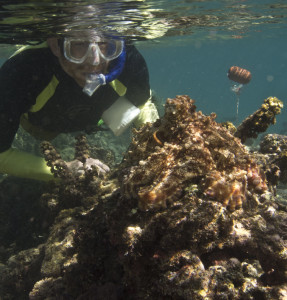Back in December, I posted a story about The Octopus Scientist, a new addition to Houghton Mifflin Harcourt Books for Young Readers’ popular and favorably-reviewed “Scientists in the Field” series devoted to a broad spectrum of science-related subjects.
As I noted in that post, The Octopus Scientists came from research on the foraging choices of octopuses from a 2013 expedition in Moorea, French Polynesia. Sy Montgomery, a naturalist who writes about human-animal relationships and developed the Young Reader series, joined the expedition that included Alaska Pacific University Professor of Marine Biology, David Scheel.
So the book is out (!) and it’s been met with favorable reviews (!!) like this one, from the American Library Association’s Booklist book review service, that goes out to every library in the nation:
This color-changing, tentacled shape-shifter can “pour” itself through a hole the size of a thimble, drill through seashells with its tongue, squirt ink and paralyze it’s prey with venom. There’s nothing on the planet like an octopus, yet its high intelligence and prowess at camouflage have made this mollusk difficult to study. This beautiful entry in the award-winning Scientists in the Field ventures to the French Polynesian island of Moorea to study Pacific day octopuses – not octopi – in the wild and unlock some of the mystery surrounding this marine animal. With infectious enthusiasm, the team searches for octopuses in their dens, so the scientists can study their personalities and diet, of which little is known. Between dives, mind-boggling octopus facts are relayed, as well as the team-members’ backgrounds. Spectacular underwater photography shows octopuses “standing” tall and stately on their tentacles, while others lie coiled with their skin drawn up into peaks to mimic coral or displaying a range of colors and patterns (purple and gold, stripes and spots) that they can conjure in one tenth of a second. Other marine life is also featured in breathtaking shots of sea turtles, dazzling fish, and giant clams. Ultimately, little new information is discovered, but this account of octopuses’ lives remains endlessly fascinating.
Well done.
The Octopus Scientists can be ordered from Amazon.

